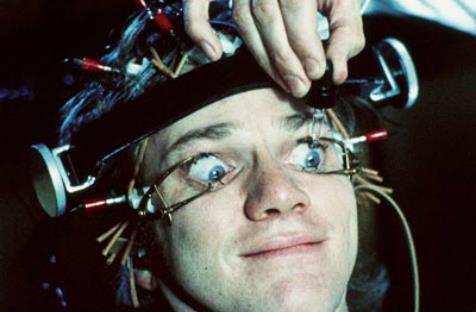Film festivals are an endurance test but there are techniques to ensure you get the most out of the opportunity.
Once a year in most major cities – and increasingly more often in many – they entice cinephiles into darkened theatres with a smorgasbord of international movie treats, then ask them to return again and again over a condensed period of intensive viewing. The act of watching film after film may, in physical terms, be a passive pursuit; however the art of attending a film festival is cinema-going at its most active – the decisions and deliberations of constructing schedules, the dashing between cinemas and darting through crowds, the sacrifices of sleep and sunlight, the heightened social interactions, and, of course, the exhaustion that inevitably follows.
Indeed, film festivals exist at the extremes of the movie-watching experience, a gauntlet of endless films, uncomfortable seats, infinite lines, and inclement weather, not to mention erratic routines and insufficient rest. Yet, for devoted fans, festivals are the pinnacle of their passion – and, with careful planning and ample enthusiasm, can be conquered.
The basics are easy: include fruit, vegetables and water amongst the constant caffeine hits and guilty candy bar purchases, dress for the elements both inside and out of the cinema, spend as much time as you can between films up, active, and outside of the theatre, and get rest whenever you can – including as much sleep as possible. The next steps, too, are obvious: consider the festival’s non-film events, stay plugged in to the social media chatter, enjoy the hospitality of the many meeting points, and never be afraid to strike up a conversation with the person next to you. The rest – the planning, the patience, the motivations and the mindset – might also stem from common sense, but always bear repeating. So, just how do you navigate a film festival with your sanity in tact?
Preparation, preparation, preparation
The three ‘P’s are the key to film festival survival; without them, even the best of intentions will fall by the wayside. Though spreadsheets and scribbled notes are crucial components of the planning stage when the program is announced, the preparation process should not stop there – in fact, as festival fatigue threatens to set in after too many hours staring at a cinema screen, thinking ahead becomes even more important.
Taking the time to contemplate the mechanics of the festival-going experience in advance will minimize frustrations later, even on the tiniest, simplest and most obvious of matters. Items to consider: film duration, the length of time between sessions, the proximity of venues and food sources, the ease of travelling between locations, and the ability to adapt should serendipity bring a new friend or another film into your orbit.
Choose your own adventure
Behind the scenes at every film festival, the hard-working staff has spent months scouring the globe to piece together the very best selection of cinema that they can – and now it’s the audience’s turn to join in. The festival timetable provides a mere blueprint, endeavouring to appeal to all possible tastes, but only the individual festival-goer can synthesize the mass of movies on offer into their own personal schedule.
There’s no one-size-fits-all solution, nor any right or wrong answers; instead, it’s all about relishing the chance to cater to and challenge personal preferences. Read the festival guide from cover to cover to make an informed choice, and possibly stumble across an intriguing title that might not otherwise have caught your eye. Unleash your inner curator and create your very own program, both choosing wisely and taking chances. You can’t see everything, but the worst outcome in the days, weeks and months that will follow the festival is to be struck down with regret about the one film that got away.
Know your limits
Everyone has a breaking point as hours spent in a cinema soon turns into days; for some it’s about the quantity of films in swift succession, for others it’s about the type of content viewed one after the other. Again, this is a matter of individual taste that can’t be dictated by external influences. This is not just about acknowledging and avoiding your very own festival kryptonite, but being honest and realistic rather than attempting to blindly test your limits.
Can you sit through several films at once, or do you need to break up the day with movement and fresh air? Will you be able to get the most out of a movie first thing in the morning? Will seeing a midnight (or close to it) session test your attention span? Are you able to achieve the difficult double of a late night screening followed by another early the next day, or do you need more time to reset between cinema outings? Is there a type or style of film that you can consume easily and often, or one best spread out throughout your viewing? Be frank and forthcoming in assessing what works best for you – only you know the answers. Like many of the films you’re likely to see, stretching your stamina too far might not have a happy ending.
Go with the flow
Strange things happen at film festivals, and not just in the many cinematic treats that adorn the multitude of screens, or the technical mishaps that occasionally hamper the presentation. A friendly face emerges when you need it most, sparking a conversational interlude. A film that wasn’t on your radar suddenly becomes a must-see after recommendations from those you know, or those you trust on social media. In some timeslots, the comfortable confines of the festival lounge or a nearby café holds more appeal than watching yet another movie.
Start each day with a plan, but don’t be restricted by it; be open to what else may come your way, and willing to adapt to the new opportunities and challenges that will undoubtedly arise. Some of the best parts of film festivals are those that can’t be planned for: the chance encounters, spontaneous connections and surprise changes of mind. Expect that anything might happen in your daily film pilgrimage; for better or worse chaos is part of the festival experience.
Take the good with the bad
The harshest reality of film festival attendance is not one of endurance, but acceptance: try as you might, you can’t and won’t like everything. Logic dictates that the more extensive your schedule of selections, the more likely it is that you’ll come across films that don’t quite turn out as you expect, as well as films that you actively acknowledge just aren’t to your taste. You might even hate something you were rather looking forward to.
Disappointment is the natural outcome, but don’t let it colour your festival experience. Stumbling outside your comfort zone – on purpose and by accident, and with positive and negative consequences – is exactly what film festivals are all about. There’s always something to redeem a session spent with even the worst film: perhaps you saw a movie you’ll never again see on a big screen, discovered a style of filmmaking that you had never before experienced, or just have a story to tell your friends, even if you’ll never get that time back.
This article was originally published 6 August 2013.





